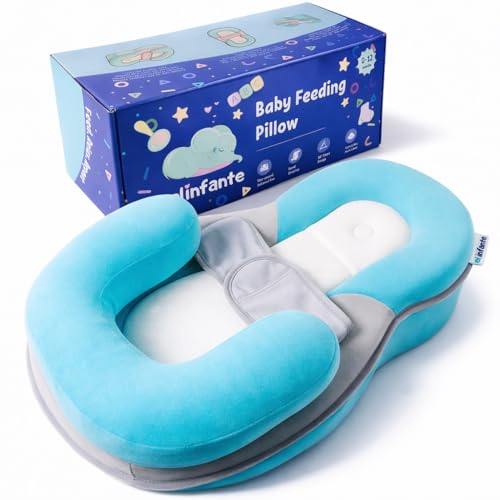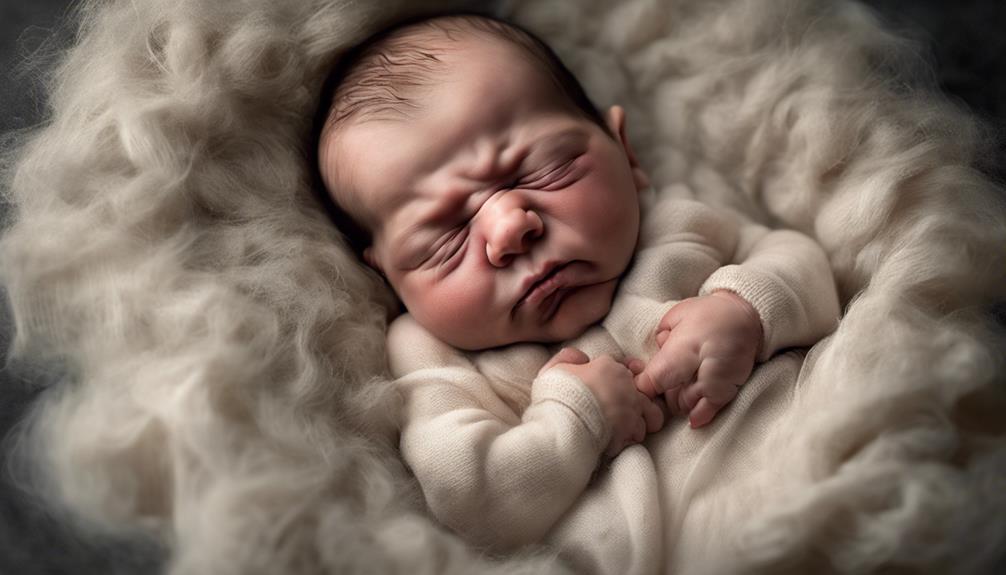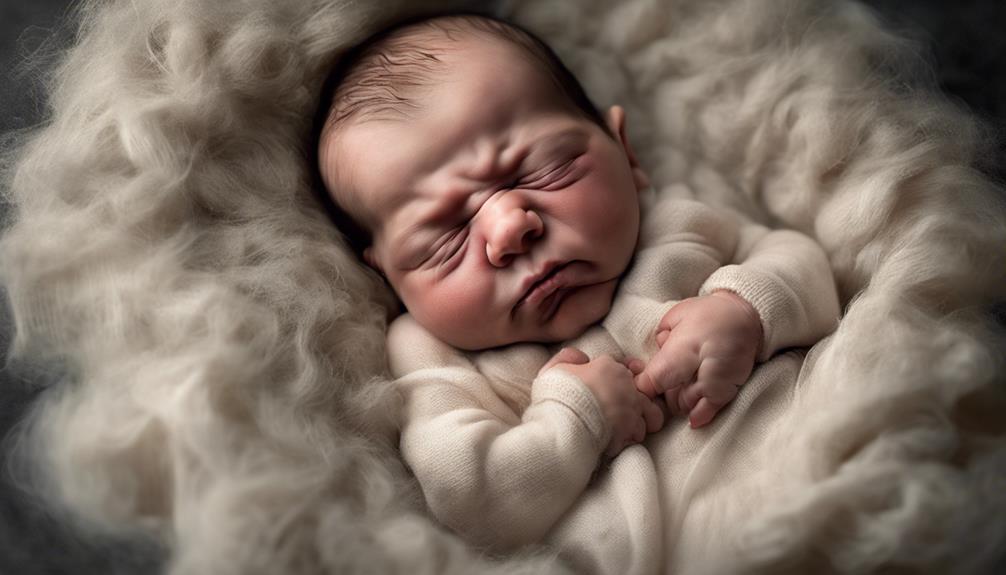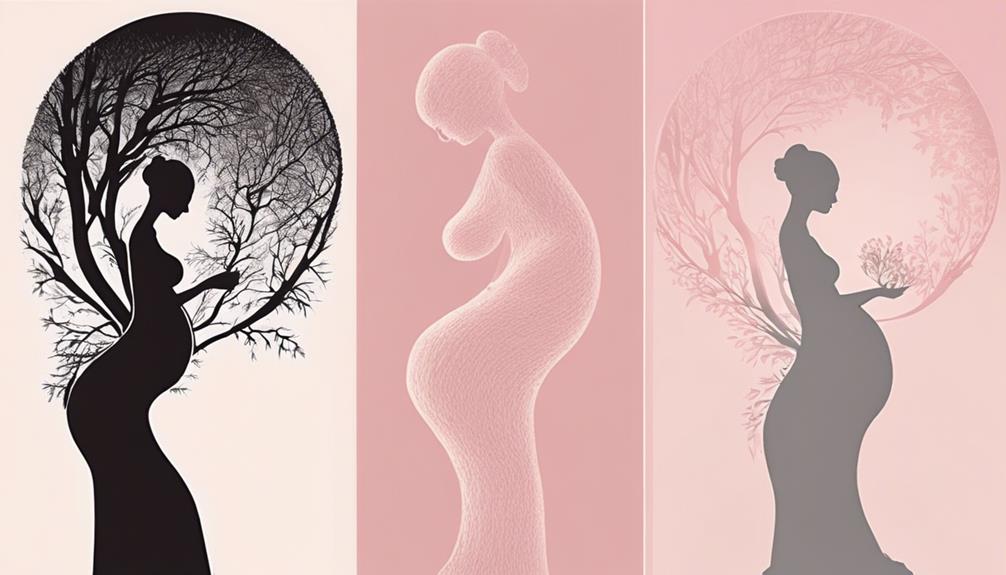As we navigate the intricate pathways of newborn sleep, we often find ourselves pondering the mysteries behind those gentle moans echoing through the night.
Have you ever wondered why these tiny beings emit such sounds in their slumber? Let's explore the veiled reasons behind this nocturnal symphony, shedding light on the subtle nuances that shape our understanding of infant slumber.
Key Takeaways
- Moaning in newborns can be due to respiratory system development and adjusting to breathing air.
- Digestive discomfort like gas, indigestion, or reflux can lead to moaning during sleep.
- Normal sleep transitions include moaning during different sleep stages for self-soothing.
- Sensory overload, discomfort, and active sleep phases with dreaming can also cause moaning.
![Portable Baby Sound Machine [White Noise for Babies Kids Adults][Timer Function][12 Soothing Sounds][Sleep Boombox] 15 Hours Battery Life, Travel,Registry,Gifts,Shower,Clips on Baby Stroller](https://m.media-amazon.com/images/I/31ZLxiagpOL._SL500_.jpg)
Portable Baby Sound Machine [White Noise for Babies Kids Adults][Timer Function][12 Soothing Sounds][Sleep Boombox] 15 Hours Battery Life, Travel,Registry,Gifts,Shower,Clips on Baby Stroller
White noise on the go: Portable sound machine with 12 kinds of the most soothing white noise can…
As an affiliate, we earn on qualifying purchases.
As an affiliate, we earn on qualifying purchases.
Developmental Changes in the Respiratory System
During the early stages of life, newborns undergo significant developmental changes in their respiratory system, adapting to breathing air after being in the protected environment of the womb. This adjustment period can lead to audible sounds like moaning during sleep. The baby's smaller airways and developing lungs play an important role in this process. As the diaphragm learns to coordinate with the expanding and contracting of the lungs, moaning may occur as a natural outcome of this intricate dance.
It's important for parents to understand that the moaning sound in newborns during sleep is often a normal part of the respiratory development process. These sounds can be unsettling at first, but rest assured, it's typically nothing to worry about. The shift from amniotic fluid breathing to air breathing can cause moaning as babies adjust, and this shift is essential for their overall well-being. So, if you hear your little one making these noises, remember that it's a sign of their respiratory system growing stronger and adapting to the new world of air around them.

El Infante Baby Feeding Pillow for Newborn Reflux Relief – Safety Nursing Pillow, Anti Colic Wedge, Elevated Infant Pillow for Acid Reflux, Breastfeeding Pillow, Baby Lounger Pillow & Bottle Support
Reflux Relief Design: Specially engineered baby reflux pillow with optimal incline. Helps reduce acid reflux symptoms, colic discomfort,…
As an affiliate, we earn on qualifying purchases.
As an affiliate, we earn on qualifying purchases.
Digestive Discomfort or Reflux

Newborns may moan in their sleep due to digestive discomfort or reflux, often caused by issues such as gas, indigestion, or reflux where stomach contents flow back into the esophagus. Their immature digestive systems can make them more prone to these challenges, leading to moments of discomfort during sleep. Swallowing air while feeding or struggling with digestion can also contribute to these moaning episodes, leaving both the baby and caregivers feeling unsettled. Babies with colic or sensitivities to certain foods may find sleep particularly challenging as they battle these digestive issues, often accompanied by moaning sounds.
—
| Digestive Discomfort or Reflux |
|---|
| – Gas |
| – Indigestion |
| – Reflux |
| – Sensitivity to Foods |
—
baby gas relief drops
As an affiliate, we earn on qualifying purchases.
As an affiliate, we earn on qualifying purchases.
Normal Sleep Transitions and Cycles
Exploring the night with a newborn involves understanding their normal sleep changes and cycles. Babies often moan during sleep shifts, moving between light and deep sleep stages. These sounds are part of infant sleep patterns and play a role in self-soothing and establishing healthy sleep habits.
While it may be concerning to hear your newborn moan, especially if you're a first-time parent, rest assured that this is typically a normal occurrence. Moaning is significant in the context of sleep cycles, indicating that your baby is moving through different stages of rest. By recognizing these noises as part of the natural rhythm of infant sleep, parents can differentiate between normal sleep sounds and signs of discomfort.
Embracing these moments as part of your baby's development can help you navigate the nighttime journey with more confidence and understanding. Remember, your presence and reassurance are key in supporting your little one through their sleep shifts.

Babytone Smart Baby Monitor – Baby Breathing Monitors with Rollover & Overheating Alarms, Long Battery Life, Real-Time Temperature Tracking, Free App for Infants & Newborns 0-24 Months (Sleep Clip)
Smart Sleep Monitor – Detects your baby's sleep position and sends instant notifications if sleeping on stomach, helping…
As an affiliate, we earn on qualifying purchases.
As an affiliate, we earn on qualifying purchases.
Sensory Overload or Discomfort
Moving from the discussion on normal sleep changes and cycles, it's important to recognize the potential impact of sensory overload or discomfort on newborns, particularly when they moan in their sleep.
- Sensory Overload: Newborns may moan in their sleep due to sensory overload from unfamiliar sounds, lights, or textures.
- Discomfort Factors: Discomfort caused by diaper rash, tight clothing, or hunger can lead to moaning in newborns during sleep.
- Temperature Sensitivity: Sensory sensitivity to temperature changes, like being too cold or too hot, might result in moaning while sleeping.
- Overstimulation: Overstimulation from a busy environment, excessive handling, or bright lights can contribute to newborns moaning in their sleep.
- Physical Discomfort: Newborns with reflux or gas discomfort may moan during sleep due to the physical sensations they experience.
Understanding these triggers for moaning in newborns during sleep can help caregivers create a more soothing and comfortable environment for their little ones, promoting better rest and overall well-being.
Dreaming and Active Sleep Phases

During the active sleep phases, newborns often experience vivid dreams accompanied by moaning sounds as a sign of increased brain activity. These active sleep phases are characterized by rapid eye movements and heightened brain activity, indicating that babies may be dreaming during this time. The moaning sounds heard during sleep can be attributed to the brain's increased activity levels, suggesting that newborns may be processing a range of sensations and experiences during their slumber.
As infants shift between different sleep stages, including the active sleep phases, they may exhibit moaning sounds, which could be linked to the vivid dreams they're having. It's believed that these moans may be a way for babies to express their experiences during sleep, reflecting the intense brain activity occurring during this time. Understanding that moaning in newborns can be connected to dreaming and active sleep phases sheds light on the complex nature of infant sleep patterns and brain development during this pivotal period.
Conclusion
After researching why newborns might moan in their sleep, we've learned that it's a normal part of their development and sleep cycle.
For example, Sarah's baby, Emma, often moans softly in her sleep as she shifts between sleep phases, helping her establish healthy sleep patterns.
Understanding these reasons can help parents feel more confident and reassured when hearing their newborns make these sleep noises.
Trust the process and enjoy those peaceful moments with your little one.









